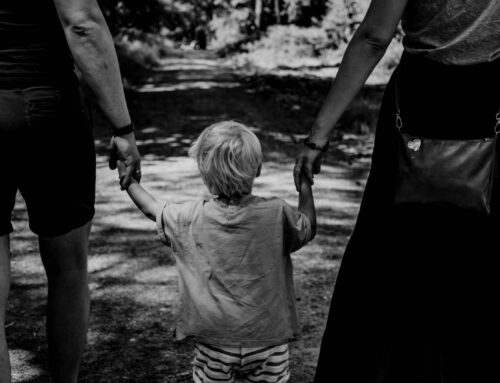Sitting your kids down and talking to them about divorce is one of the hardest talks a parent can have with a child. Parents are worried about hurting their children and about their children’s reactions. Parents also are having their own big feelings about what’s happening to their marriage and their family. Parents worry about their children’s adjustment to this family transition in both the short and long term. As such, it feels like so much is riding on what is a brief but seismic conversation.
This brief yet consequential conversation conveys way more than the news about this monumental change that will happen in how the family is structured. How parents approach “the talk” also conveys to children how parents intend to handle their parenting relationship and how they intend to approach their children about divorce.
If you are a parent fretting about talking to your kids about divorce, here are the key things I want you to keep in mind.
- Both parents together telling all the children at the same time is optimal. If children are significantly different
in ages, follow up with them separately to talk further at their own age level. Keep the conversation geared to the level of the youngest child when children are all together. - Consider timing the talk for about 2xs a child’s age as the number of days in advance of any significant change that will be taking place, such as a parent moving out. Younger children have less of a time horizon, while teens need more time.
- Have many details decided and agreed upon (living arrangements and at least a temporary plan of when the children
will have time with each parent) so that you can give children specific information about what they
can expect. - Find a comfortable place to talk (preferably at home) but that is not a special place for the child (not their
bedrooms or a child play area). - Keep it brief and focused on key points listed below.
- You can show genuine emotions, however maintain personal control. Otherwise, your emotions
may be scary or distracting to your children’s experience of this event. Focus on your children and
their needs and reassure them you can take care of yourself and will support them. Some emotion
is understandable and can validate for children their own emotional experience.
While talking to kids about divorce and transitioning to two homes is a big discussion emotionally, it is really a rather brief conversation. Here are some of the main points you will want to convey.
- Introduce the topic without beating around the bush. “We have important news”
- We have decided to separate/divorce/live in two homes…
- Provide a brief explanation that has appropriate boundaries (don’t share the intimate details about your marriage), yet shares information to help them make sense of their reality and this news at their age/developmental level. Examples might be… “We were unable to live well together married”, or “were unable to resolve our differences”, or
some variant “so we decided to restructure our family to be parents together from two homes” or “we decided we could parent better from two homes”. - Acknowledge and validate children’s emotions about hearing this news.
- Discuss specifics of what will change for them, what will happen next.
- Discuss specifics and reassure about what will stay the same for them.
- Reassure that you are still a family, you both love them very much, will help them adjust, and will
both always be their parents and be there for them. - Resist any impulse to make this sound like a good thing (e.g. the “two Christmases!” approach). It will be hard to sit with your children’s feelings without trying to minimize or downplay the painful aspects. While this is natural, as a parent you want to protect your children from pain, it is really important to validate the pain of this experience for them and not downplay it.
As you can see, the key points to convey will not take long. This is a brief conversation. How you deliver the conversation has the potential to support your children and convey some important things to them about how you intend to handle this transition. When parents can sit down together, without conflict or blame, they convey to their children that parents will still come together for them, prioritize them and their needs, and that this change won’t change that. Following these guidelines conveys that you care about and validate their feelings and intend to support them in the process and acknowledge their experience of the changes.
Starting the divorce process in a supportive, child-centered way is the first step in supporting your children’s adjustment.
Make sure you feel fully supported with quality information and the help you need to set yourself and your children up for the best possible way to share this difficult news and begin this challenging journey to your reconfigured family. Check out the resources below.
Resource for talking to kids about divorce . I have created a short educational video The Talk
Resource for Co-Parenting The Quick Guide to Co-Parenting after Divorce
Other resources here and if you need more support, consider co-parenting consultation or psychotherapy.






